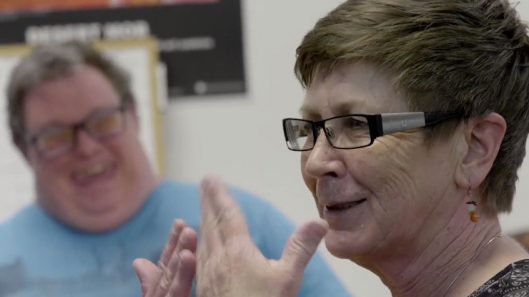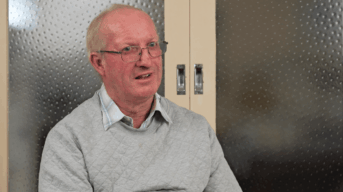Running a peer support group
Peers discuss some of the things to think about when running a successful peer group, including:
- setting ground rules and boundaries
- creating space for connections to happen naturally
- managing difficult conversations
- the importance of humour
- moving from getting to giving back
- building and changing community
View our stories about peer support.
Transcript
(Accordion music)
Voice: Main title. Running a peer support group. George is preparing for a peer support group. Shu is making notes.
George: What we need to do is organise a couple of things.
Shu: Yes.
George: The topic this week is about housing.
Shu: Yes
George: And some of the housing problems we’re having. I think there’s going to be a lot of Chinese people here. We may need an interpreter. And what we’ll do is we’ll invite Suzie. Suzie has muscular dystrophy and she’s having issues with her housing.
Shu: Yep.
George: And she’s taking it to the appeals tribunal, so she’ll be one of our guest speakers. And we’ve got another person, and they have an intellectual disability. I think you may know, Joe?
Shu: Yep.
George: He’s going to be there to talk as well so…if we give them each about 10 or fifteen minutes just to talk a bit through what’s happening. And then we’ll do a bit of a Q & A after where we can ask questions
(Music fades out.)
Voice: Title: Ground rules and boundaries. Cath speaking besides Ros
Cath: I think there’s a bit of learning as you go with peer support. I think it varies, depending on the group that you’re with. But then there’s this magic, organic thing that’s really hard to put the words on where the group almost does its own thing and they decide…we decide with each other how support will actually look in that group.
Some of it is around how you actually run a group, so it is good to set some boundaries, to have some ground rules, and they’ll vary a bit, depending on who’s in the group. And so we might hear something in the peer group that really gets us worked up and is really uncomfortable for us but we have to kind of engage with that without judging that person and kind of trying to say, where they are at on that journey is…is where they’re at.
Voice: Title: Creating space for connections to happen naturally.
Cath: It is around that magic of story. And part of knowing that story is maybe facilitating some connections. So, if I know Ros, that you’re really into people being included in their local school, people with disability being included in education, and someone raises a question around not knowing how to think about that for their family, or being in a school where it’s not working or they’re not happy, then I would, as a member of that peer support group, say ‘Why don’t you have a chat with Ros because that’s something she’s really passionate about?’. It’s just again knowing when you need to facilitate it in a formal, structured way but also leaving space that they’re going to do it for themselves, that people in the group are going to find their own way of connecting in ways that they’re comfortable.
Voice: Title: Difficult conversations. Ros speaking beside Cath
Ros: Sometimes when the conversation starts to go a bit difficult, or one-directed or…it’s finding that way to turn the corner and bring it back to somewhere where you’re going to find an outcome or somewhere where it would be beneficial.
Voice: Cath.
Cath: It’s tricky to know how to manage it sometimes. It can be a reminder to go back to the ground rules or the group rules hopefully that the peer support group has worked on together and decided upon together.
Voice: Title: The importance of humour. Cath.
Cath: It’s the best place to go for advice, for support, for understanding, for humour. We’re kind of being serious about peer support but I laugh more in my life than I do at any other time. Really funny things happen when people that don’t know each other who have different needs and quite different takes on the world and their life. When we come together, there’s a lot of humour.
Voice: Ros.
Ros: You kind of take the seriousness out of it because outside that network it is very serious, it’s about the doom and the gloom, and as a parent that’s what you’re used to hearing. And I feel that peer support network is the future and the can-dos, will-dos and going-to-dos…
Voice: Title: From getting to giving. Cath.
Cath: So it’s usually a sense of coming from a need, whether that’s for belonging or identity or information or to fill in their time on a Wednesday morning. And then hopefully, they go on a bit of a journey having had a sense of ‘Well I’ve had some information, I’ve had my needs met’, if you like. ‘And another person was here last time and I could probably give them a hand’, ‘or give them some information or just be there to see how they go on the next steps that they’re going to take’. So hopefully it changes from coming with a need to coming because you want to contribute.
Title: Building and changing community. Cath.
Cath: Peer support is this amazing place where you can come and get boosted by being with people who understand you and who share a lot of your lived experience but from that space you are then trying to…we are then trying to connect with our broader community. So it’s like coming to the people who get me and getting some ideas and some support and some affirmation and some validation maybe, and then going out into the community because that’s where I want to live.
Voice: Team Up is a project of Council for Intellectual Disability.



 1800 424 065
1800 424 065 


















